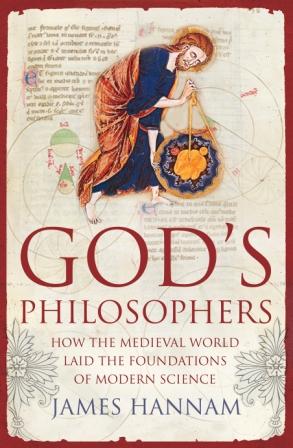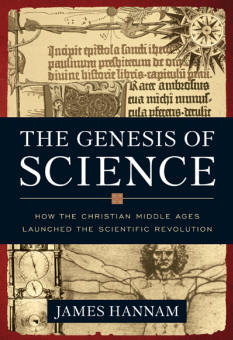
|
If you have enjoyed Bede's Library, you can order my book, The Genesis of Science: How the Christian Middle Ages Launched the Scientific Revolution (US) from Amazon.com or God's Philosophers: How the Medieval World Laid the Foundations of Modern Science (UK) from Amazon.co.uk. |
|
For my latest thoughts on science, politics, religion and history, read Quodlibeta
|
Doing the Math with God
![]()
A review of The Probability of God
by Stephen Unwin, Crown Forum, 2003
I was at a talk given by the esteemed expert on fertility, Lord Winston, about Judaism and science. Lord Winston is a devout Jew and views the old nostrums about science and religion being necessarily in conflict as garbage. However, he started his talk with a light hearted joke about the book under review that very much implied he did not take it very seriously. This is actually a most unusual and very interesting book. It does exactly what it says on the tin and calculates the probability that God exists. But, I suppose the first question to consider is whether Unwin himself is even being serious. The book is full of skits, (quite good) jokes and is written in a sometimes slightly flippant way which does not enhance any pleas for earnestness. My own conclusion is that Unwin has his tongue in his cheek to a great extent but is doing so to make a number of very serious points. The subject matter is necessarily obtuse and humour is as good a way as any to approach it.
So how do you set about calculating the probability that God exists? Unwin says that we should use something called Bayesian probability theory to do so. His exposition of how this works is within reach of even the most mathematically averse reader and he constructs an equation that allows him to handle lots of different kinds of evidence. His methodology is clear and hard to fault. The controversy arises when he has to decide how he is going to fit the evidence into his equation. It is at this point that the process ceases to be objective as we all interpret different evidence in different ways. While you often here the more stupid kind of atheist claim there is no evidence that God exists, what they really mean is that they are not convinced by the evidence there is. The fact is that the hard core atheist is not going to play Unwin’s game. So what sort of evidence do we have at hand? Unwin suggests six categories: morality, providence, miracles, natural evil, moral evil and religious experience. Immediately we notice that not all of this is going to help the theistic case. But what about other kinds of evidence that are available? Perhaps Unwin is drawing the boundaries a little too tightly. It is here that I face my strongest disagreement with his work because Unwin utterly rejects the fine tuning argument for the existence of God. He claims that this is because if the universe were not fine tuned we should not be here to ask why it is. This makes the fine tuning argument viciously circular and so invalid. Beyond pointing out that this argument has been refuted by Richard Swinburne, John Polkinghorne and Keith Ward among others, I will not do more than note our disagreement here. That is why some atheist scientists now have felt the need to postulate an infinite array of universes to explain fine tuning.
In a more general sense, the way that Unwin’s method works means that how one divides up the evidence and how long we make our list is extremely important to the end result. So is the extent to which we bring our own preconceptions to the table. Whether we actually have religious experiences will inform how much weight we give that question. Likewise, if we feel our prayers have been answered we will attach a lot of importance to divine providence. And if, like Unwin and I, a true miracle has never occurred before our eyes, we would them give less credence to them than those who have seen one. However, in the way he handles the evidence, Unwin also makes the most important conceptual point in his book. Each set of data is evaluated under both possibilities – either God exists or he doesn’t. Thus it is not sufficient to dismiss morality as a possible result of evolution. We have to ask if morality is more likely in a God created world than otherwise. And here we must admit that it is – morality is a near certainty in a world where God exists but in a purely material world it is easy to imagine intelligent life evolving without it. A point to God. On the flip side, it is far easier to comprehend diseases being prevalent in a blind amoral universe than one guided by a loving creator. The atheist wins out on this point. I will not give away where Unwin ends up himself, but suffice to say, his result is his alone and others will get different answers. Actually doing the exercise is valuable in itself as it forces us to face up to differences between our instincts and what we can rationally justify.
Unwin finds that his instinctive faith in God is a good deal greater than the result of his calculations shows as justified. The last section of the book is a discussion of how this can come about and why our gut feelings do not always match our considered conclusions. While I found the discussion illuminating it lacked the rigour that would have made it really useful.
Overall this book is a good deal deeper than it purports to be. Unwin is using Bayesian probability theory to set a stage on which to ask serious questions and to force himself to reconsider his own internalised dialogue between faith and reason. The way that these interact is an important topic which Unwin has laid out in an original and interesting way that cannot fail to widen the debate. As for the probability calculations, these really take the form of a private meditation, but one so clearly explained, that we can partake in the same experience ourselves. Like the beads of a rosary, the different kinds of evidence provide distinct nodes for considering the action or otherwise of God in the world. Alas, as I mentioned above, I cannot see many atheists even being willing to play the game.
Back to contents
![]()

